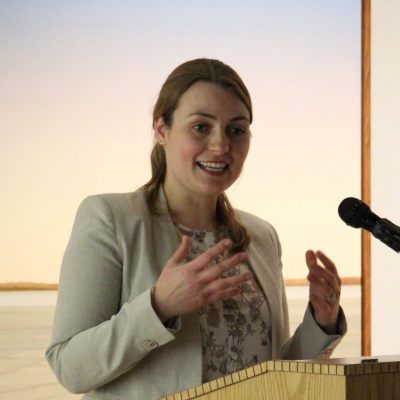19 Zombies, Doggos, and Queer Plants
Why the Natural Scientist’s Perspective Matters to the Humanities and Beyond
Joela Jacobs
Are you a “math person”? Growing up, I thought I wasn’t, and I gravitated toward subjects like literature, history, and philosophy in school. I grew up in Germany, and when I started college there, I chose English and German literature as my majors and thought I would become a teacher — because I liked my German and English high school teachers. Not particularly adventurous, right? In the end, I did become a teacher — a university professor of German studies at UA — but I moved to another country for that, which was pretty adventurous after all. And my academic interests didn’t stay the same as they were in high school either. I might still not solve math equations in my spare time, but I did discover a fascination with the natural sciences that has transformed what I teach and research, even though my PhD is in German studies.
One of my favorite courses to teach is a Gen Ed class called “From Animation to Zombies: The Ethics, (Bio)Politics, and Aesthetics of Defining Life.” It’s not sixteen weeks of watching zombie movies, though that would be pretty fun too; instead, it looks at the idea of “life” from A (like animation) to Z (like zombies), taking into account as many different perspectives as possible. From day one, those perspectives involve the humanities, arts, and sciences. And it turns out that none of these disciplines contain an easy answer or can do without each other in their thinking about life. Medical definitions of the beginning or end of life need philosophers to determine their ethical implications, just as artists refer to biological knowledge to represent life. Whether we discuss how to define life for animals, aliens, and AI, or whether we learn about immortal jellyfish and plants that can hear themselves being eaten, the course’s materials bring together different disciplinary perspectives. With an idea like “life,” there is no separation between academic approaches, or between mind and matter. Life is everywhere, it’s relevant to everyone, and we need multiple perspectives to understand better what it means to define it one way or another for ourselves and others. Having some competency and knowledge in the natural sciences has been indispensable for me every single time I enter the classroom, and the discussions always make me eager to learn more because they show me what I don’t know yet.
The idea for this course about life came out of my research — because that is where I first realized how important the perspectives of natural scientists are to my own study of literature and culture. I wrote my doctoral dissertation about a set of texts that are told from the perspective of animals and make plants their protagonists. I quickly realized that I had to understand more about dogs and roses to analyze these narratives. And so off I went to read studies about canine cognition and linguistic abilities, with a bit of botany and the history of invasive plant species on the side. Along the way, I wrote research articles about the grammar of doggo speak (only good bois there) and about moments of panic regarding the promiscuity of plants in the 18th and 19th century — whose reproduction includes a lot more than two gender options, suggesting a wide variety of natural sexual identities (people back then were as upset about that as you might imagine). And my interests expanded, I began to realize how responses to climate change are culturally and historically shaped. To research and teach about German and U.S./American cultures of environmentalism, I had to understand more about the science behind global warming.
For all of this work, I depend on the perspectives of natural scientists to explain details to me and point me to more research — be it a quick lesson in insect molting before taking another look at Kafka’s story The Metamorphosis, or a better understanding of virology for my zombies unit. And I always think it’s fun for my colleagues to look at what they study from my perspective, too. With that in mind, I hope you get to have similar conversations in your General Education courses and make some friends in different disciplines. See you there!


